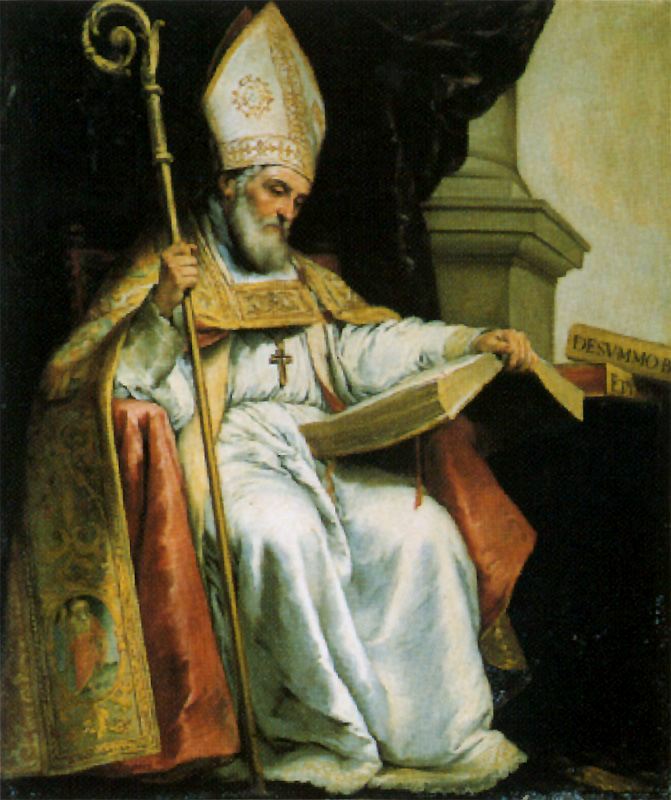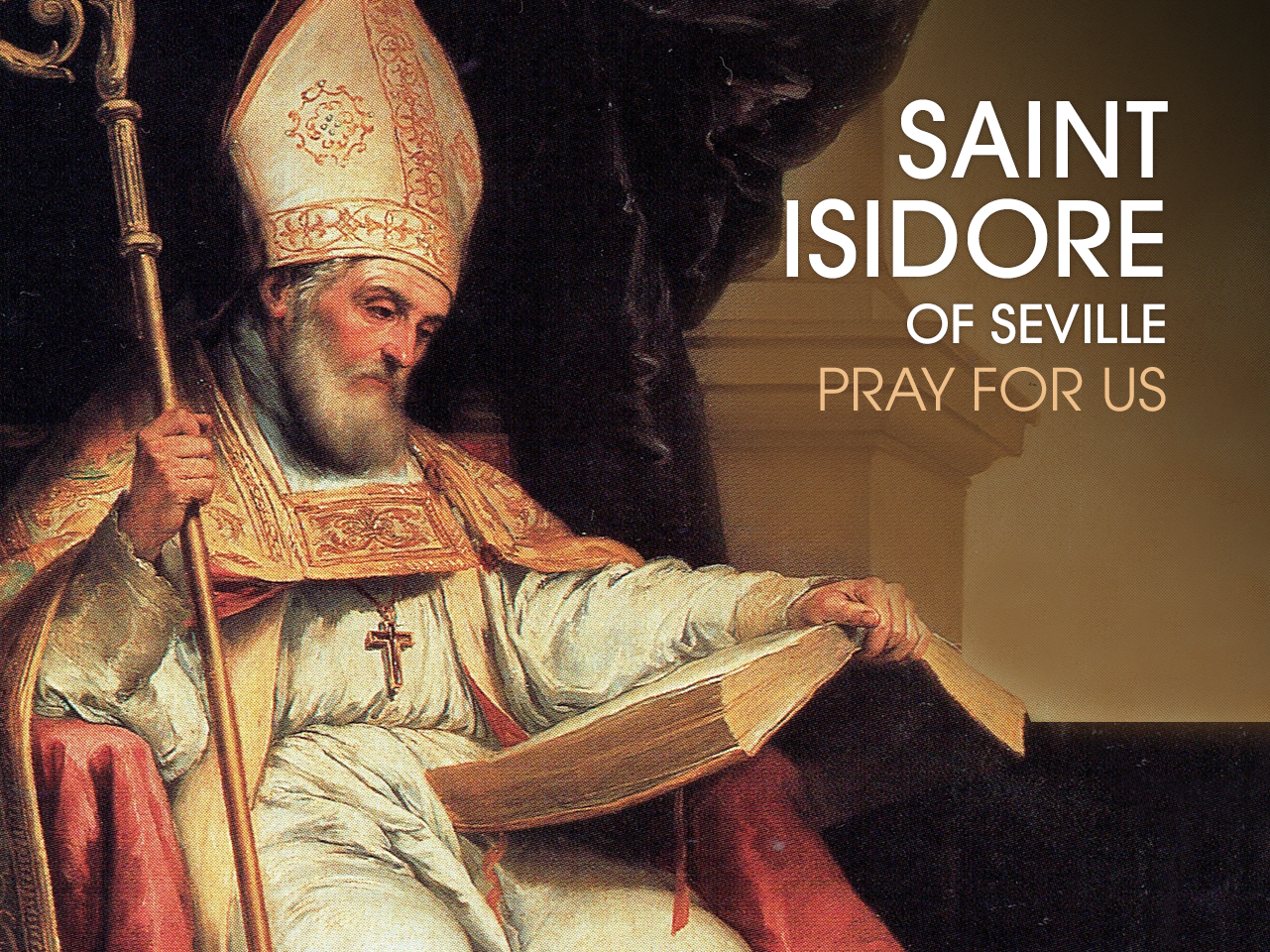Even saints run away, at first. Peter, all of them, ran away, at first. Isidore ran away, too. Isidore served as Archbishop of Seville for more than three decades as the classical world was fading away and the Dark Ages loomed on every side. He is considered, “The last scholar of the ancient world”.
Once, when Isidore was a boy, he ran away from home and from school. His brother Leander, some twenty years older than he, was his teacher, and a very strict and demanding one. Isidore despaired of ever pleasing his brother in his studies. While Isidore sat by himself out in the woods, loafing and feeling sorry for himself, he watched some drops of water falling on a rock. Then he noticed that the dripping water had worn a hole in the hard rock! The thought came to him that he could do what the little drops of water did. Little by little, by sticking to it, he could learn all his brother demanded, and maybe even more.
Isidore realized that if he kept working at his studies, his seemingly small efforts would eventually pay off in great learning. He also may have hoped that his efforts would also wear down the rock of his brother’s heart. When he returned home, however, his brother in exasperation confined him to a cell (probably in a monastery) to complete his studies, not believing that he wouldn’t run away again. Either there must have been a loving side to this relationship or Isidore was remarkably forgiving, even for a saint, because later he would work side by side with his brother and after Leander’s death, Isidore would complete many of the projects he began including a missal and breviary.
In a time where it’s fashionable to blame the past for our present and future problems, Isidore was able to separate the abusive way he was taught from the joy of learning. He didn’t run from learning after he left his brother but embraced education and made it his life’s work. Isidore rose above his past to become known as the greatest teacher in Spain. His love of learning made him promote the establishment of a seminary in every diocese of Spain. He didn’t limit his own studies and didn’t want others to as well. In a unique move, he made sure that all branches of knowledge including the arts and medicine were taught in the seminaries.
His encyclopedia of knowledge, the Etymologies, was a popular textbook for nine centuries. He also wrote books on grammar, astronomy, geography, history, and biography as well as theology. When the Arabs brought study of Aristotle back to Europe, this was nothing new to Spain because Isidore’s open mind had already reintroduced the philosopher to students there.
Still trying to wear away rock with water, he helped convert the barbarian Visigoths from Arianism, which denies the divinity of Christ, to Catholicism. By the time of his death, the light of his learning caught fire in Spanish minds and held back the Dark Ages of barbarism from Spain. But even greater than his outstanding mind must have been the genius of his heart that allowed him to see beyond rejection and discouragement to joy and possibility. Many of his remains are interred in the cathedral of Murcia, Spain.
-by José Alcoverro, 1892, outside the Biblioteca Nacional de España, in Madrid.
“Prayer purifies us, reading instructs us. Both are good when both are possible. Otherwise, prayer is better than reading. If a man wants to be always in God’s company, he must pray regularly and read regularly. When we pray, we talk to God; when we read, God talks to us. All spiritual growth comes from reading and reflection. By reading we learn what we did not know; by reflection we retain what we have learned. Reading the holy Scriptures confers two benefits. It trains the mind to understand them; it turns man’s attention from the follies of the world and leads him to the love of God. The conscientious reader will be more concerned to carry out what he has read than merely to acquire knowledge of it. In reading we aim at knowing, but we must put into practice what we have learned in our course of study. The more you devote yourself to study of the sacred utterances, the richer will be your understanding of them, just as the more the soil is tilled, the richer the harvest. The man who is slow to grasp things but who really tries hard is rewarded, equally he who does not cultivate his God-given intellectual ability is condemned for despising his gifts and sinning by sloth. Learning unsupported by grace may get into our ears; it never reaches the heart. But when God’s grace touches our innermost minds to bring understanding, His word which has been received by the ear sinks deep into the heart.” – from Book of Maxims by Saint Isidore
“Heresy is from the Greek word meaning ‘choice’…. But we are not permitted to believe whatever we choose, nor to choose whatever someone else has believed. We have the Apostles of God as authorities, who did not…choose what they would believe but faithfully transmitted the teachings of Christ. So, even if an angel from heaven should preach otherwise, he shall be called anathema.” – Saint Isidore
“Confession heals, confession justifies, confession grants pardon of sin. All hope consists in confession. In confession there is a chance for mercy. Believe it firmly, do not doubt, do not hesitate, never despair of the mercy of God.”
–St. Isidore of Seville
“Indeed, just as we must love God in contemplation, so we must love our neighbor with action,” he declared. “It is therefore impossible to live without the presence of both the one and the other form of life, nor can we live without experiencing both the one and the other.” – Saint Isidore
“In the active life, all the vices are first of all to be removed by the practice of good works, so that in the contemplative life a man may, with now purified mental gaze, pass on to the contemplation of the Divine Light.”
-St. Isidore
“The suffering of adversity does not degrade you but exalts you. Human tribulation teaches you; it does not destroy you. The more we are afflicted in this world, the greater is our assurance for the next. The more we sorrow in the present… the greater will be our joy in the future.”
-St. Isidore of Seville
“Letters are signs of things, symbols of words, whose power is so great that without a voice they speak to us the words of the absent; for they introduce words by the eye, not by the ear.”
-St. Isidore of Seville
Almighty and eternal God, who created us in Thy image and bade us to seek after all that is good, true and beautiful, especially in the divine person of Thy only-begotten Son, our Lord Jesus Christ, grant we beseech Thee, that, through the intercession of Saint Isidore, bishop and doctor, during our journeys through the internet we will direct our hands and eyes only to that which is pleasing to Thee and treat with charity and patience all those souls whom we encounter. Through Christ our Lord. Amen
Blessed Lent!
Love,
Matthew



